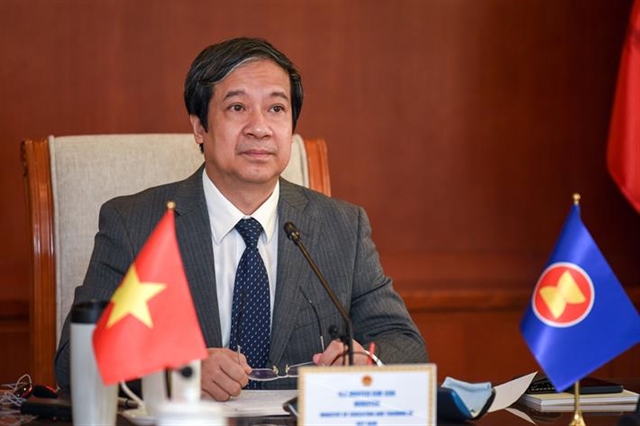 Society
Society


|
| Minister of Education and Training Nguyễn Kim Sơn. — VNA/VNS Photo |
BEIJING — Minister of Education and Training Nguyễn Kim Sơn joined remotely from Việt Nam a roundtable event for education ministers from ASEAN and China, held as part of the 15th China-ASEAN Education Cooperation Week (CACW) underway in Guizhou, China.
The CACW is co-organised by the Ministries of Foreign Affairs and Education of China, China-ASEAN Centre, and the Southeast Asian Ministers of Education Organisations (SEAMEO).
In his remarks delivered at the hybrid roundtable, Sơn said his ministry has pushed for online and televised classes at the time of the COVID-19 pandemic.
During the school closure period in Việt Nam, around seven million students learned virtually, 70 per cent used only the mobile devices of their parents/guardians, while up to 1.5 million didn't have access to any digital device to aid their study, according to the minister.
The lack of infrastructure not only affects the quality of learning but also leads to inequality in education, and digital transformation must be connecting people instead of deepening existing gaps.
To minimise the risks from digital transformation, Minister Sơn said that at the micro level, it would be necessary to ensure that teachers and students have enhanced access to information to build up professional skills in the digital environment.
At the macro level, it would be necessary to pay attention to the relationship between the development of technology and the fundamental impacts on the teaching-learning process and the pedagogical environment. This would require deep understanding of the interrelationships between technology and people, he noted.
Pressure from the pandemic had provided good opportunities for the acceleration of digital transformation in education, he said, adding that the core solutions for digital transformation were closely associated with the improvement of human resources and the expansion of research cooperation in the field.
The Vietnamese minister said he hoped delegates would share their experiences and initiatives to step up a partnership and together look forward to the shared prosperity and development and to a common goal of peace and cordiality.
A number of forums and symposiums on education are also scheduled during the week-long CACW which takes place until August 28.
Launched in 2008, the CAECW has played an important part in fostering education partnerships and people-to-people exchanges between China and ASEAN nations. It has contributed to the signing of nearly 2,000 agreements and memorandums of understanding and the launch of more than 400 projects and activities.
The CAECW has been incorporated into the five-year action plan on Mekong-Lancang Cooperation (2018-22) and the ASEAN-China Strategic Partnership with a vision towards 2030. — VNS




